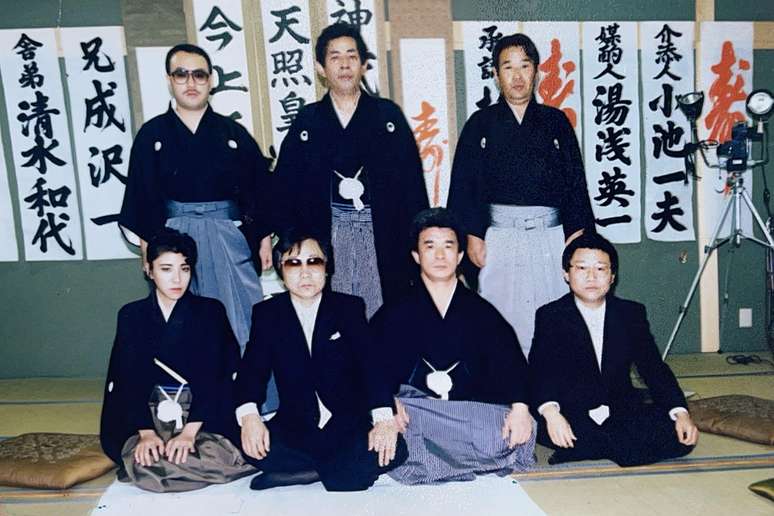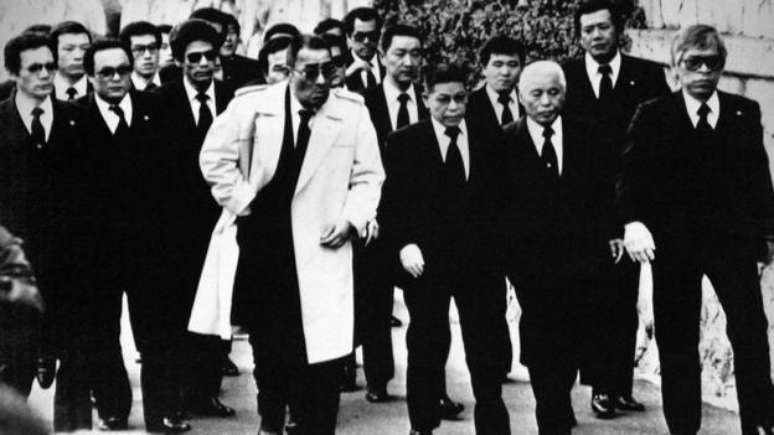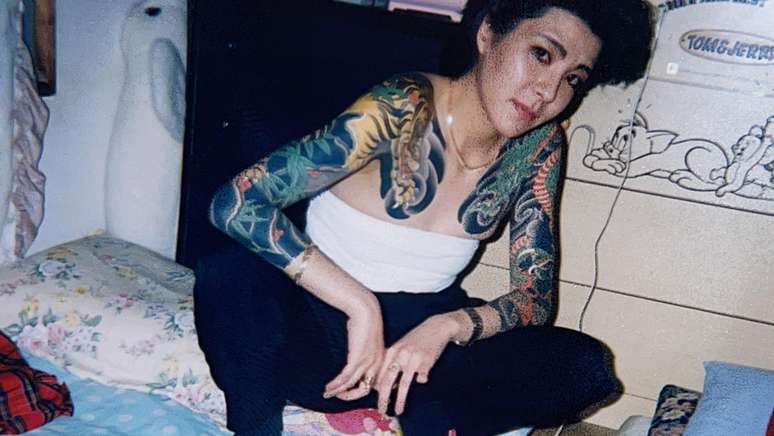Her passion for violence and rebellion opened doors previously closed to women in the institution.
Only men can belong to the Yakuza.
This is one of the indissoluble principles that govern the Japanese mafia, made up of more than twenty criminal groups across the country.
In its more than three centuries of history, only one woman is known to have completed the ritual of belonging to the Yakuza.
She is Nishimura Mako, now 57 and who from a young age showed an unusual rebelliousness that led her to join motorcycle gangs known as bōsozoku.
The meeting with a young member of the Yakuza represents the decisive turning point in her life: fascinated by the world of organized crime, she will soon be involved in the illicit activities of the mafia.
Nishimura’s fragile appearance contrasted with his propensity for violence: “I was very good at fighting, I never lost to a man,” he once confessed to Martina Baradel, a researcher at Oxford University who earned his trust after years of studying the Yakuza. from inside.
His criminal history – which included everything from beating rivals to drug trafficking or prostitution of women – and his ruthless character opened doors that had until then been closed to women.
The decline of the Yakuza in recent decades and personal circumstances (she is the mother of two children) led Nishimura to abandon the underworld and start a normal life.
Today she runs a charity dedicated to helping other former members who, like her, are trying to reintegrate into society.
Fascinated by the story of Nishimura and the Yakuza, Martina Baradel (Trieste, Italy, 1988) created a network of contacts with exponents of Japanese organized crime.

This has allowed her to build a close friendship with Nishimura Mako, who she visits often.
BBC Mundo interviewed the Italian researcher a few hours after meeting the former Yakuza member in Gifu, 270 kilometers west of Tokyo.
BBC News Brasil – How do we know that Mako is the only woman who belonged to the Yakuza?
Martina Baradel – If there was another, she would be known. The police have the background of Yakuza members. Many women have helped or supported the mafia informally, but there is none like her.
It was because of the boss, who made the unprecedented decision to make her a member of the group. And it is proven that she is a full member, as there are photos of her from her lei sakazuki ceremony, which symbolizes her loyalty and commitment to the Japanese mafia.

BBC News Brasil – How did you get there?
Baradel – My fascination with the Yakuza began during my university studies, when I met Yakuza members by chance on a beach in Japan. This first meeting aroused a deep interest in me, which motivated me to dedicate my academic career to the study of the Yakuza. this institution.
The group studying Yakuza is very small, so I got to know everyone, from journalists to researchers, and my senpai (mentor) told me that I would meet Nishimura and introduced us.
BBC News Brasil – And how did the first meeting go?
Baradel – There was a charity event for the reintegration and rehabilitation of ex-prisoners and she was there with people from her group. We went to dinner and then to karaoke. She doesn’t drink, doesn’t smoke and was cautious the first time.
Then I went to see her again to talk some more. I subsequently continued to get to know her and we established a rapport as we deepened our conversations.
BBC News Brasil – What led Mako to join the Yakuza?
Baradel – She confessed to me that since she was little she felt a passion for violence and she really liked fights. She started hanging out with biker gangs and having violent encounters with other people, something that fascinated her.
And then he realized that he had unusual strength for his physical composition, given that he measures just over one and a half meters and weighs 45 kg.
BBC News Brasil – Why was her little finger amputated?
Baradel – He did it when he was very young, at the beginning of his career, when he was around 20 years old. She took responsibility for a problem that occurred. Lost drugs or something. And then she thought that she would be fine with tattoos too, since they are the two most visible symbols of the Yakuza aesthetic.
She also says she doesn’t feel pain and didn’t mind amputating the little fingers of colleagues who didn’t want to do it themselves. Her skill in the yubitsume ritual, which involves amputating the final phalanx of the little finger, has earned her the nickname “master of finger cutting.”
BBC News Brasil – How did you interact in Japanese society as part of the yakuza?
Baradel – She first left the Yakuza when she became pregnant. She was trained as a caregiver and wanted to find a normal job, but Japanese society rejected her, mainly because of her tattoos, which suggest membership in the mafia.
She always tried to hide them by wearing long sleeves, but eventually her colleagues noticed and she was fired from two jobs.
BBC News Brasil – And this made you go back to the mafia?
Baradel – Indeed. She was very upset, because she was trying to be a mother, have a good job and leave that life behind her, but they closed the doors to her because she was different. She thought it was very unfair, so she became even more radical.
It was then that she found herself completely tattooed down to her fingertips and resigned herself to her fate. Before she came back, she was married for a while to a Yakuza member turned boss, so she also played the role of the boss’s wife.
BBC News Brasil – Now elderly, she has definitively left the mafia. Is it easy to leave the Yakuza?
Baradel – If your boss agrees, you may have to pay something, or sometimes even nothing if the boss thinks it’s okay for you to leave. There are different circumstances, but most of the time you can get out without too much trouble.
BBC News Brasil – It’s surprising, considering it’s about the mafia.
Baradel – Yes, it’s a mafia, but you really don’t have many secrets to tell. The structure is known and the police already know who your boss is, they know your address and you can meet whoever you want.
It’s not like, for example, in Sicily, where mafiosi could remain hidden for 30 years.
Furthermore, those who go do not report the rest because it is dishonorable behavior for the Yakuza.
BBC News Brazil – How do Yakuza and organized crime cartels compare in Italy, Latin America and other countries?
Baradel – What they have in common is that they offer private protection and have established control over the territory, which allows them to operate both illegal and legal markets.
The Yakuza has a governance dimension that it can maintain over time, similar to the mafia in Italy and Russia, offering dispute resolution services and controlling the markets to receive protection money.

BBC News Brasil – Considering that Nishimura is an exception, what is the role of women in Yakuza?
Baradel – Usually occurs through a relationship or marriage. Although they are not officially members, they usually do some kind of work. For example, if you are the wife of a leader, you cannot limit yourself to living an ostentatious life, and you are expected to act as a mediator between the leader and the younger members.
And, of course, there is also exploitation, because the Yakuza operates in night entertainment, prostitution and the sex and pornography industry. She (Nishimura Mako) did this too: she bought, sold and exploited women.
BBC News Brasil – What have you learned from members of the Yakuza?
Baradel – I see that they may have made mistakes, obviously, because they carry out criminal activities, but I don’t see them as bad people.
They were simply looking for something they didn’t have. Many of them come from a background without many opportunities. In Japan, if you don’t have an education or a family to support you, it’s very difficult to find a job and get ahead. So I understand that they will try to find a sense of community and purpose in something that isn’t beautiful.
And for the most part it is better to be part of the Yakuza than an informal gang, because the Yakuza has some control over its members and also some kind of ideological agenda.
BBC News Brasil – You’ve been researching the Yakuza for nine years, mixing with them. Doesn’t this pose some risks?
Baradel – Not many. The criminal groups that make up the Yakuza are not actually illegal, unlike the Italian mafia. In Japan it is not illegal to be part of a Yakuza group, which is why they have chapters and are recognized in society.
Since it is neither invisible nor illegal, it is not that risky. Furthermore, we are usually introduced by a third person, which implies mutual responsibility to behave correctly. And since I’m a foreigner and a woman, this works in my favor, because it would be really bad for them if something happened to me.
Source: Terra
Rose James is a Gossipify movie and series reviewer known for her in-depth analysis and unique perspective on the latest releases. With a background in film studies, she provides engaging and informative reviews, and keeps readers up to date with industry trends and emerging talents.







